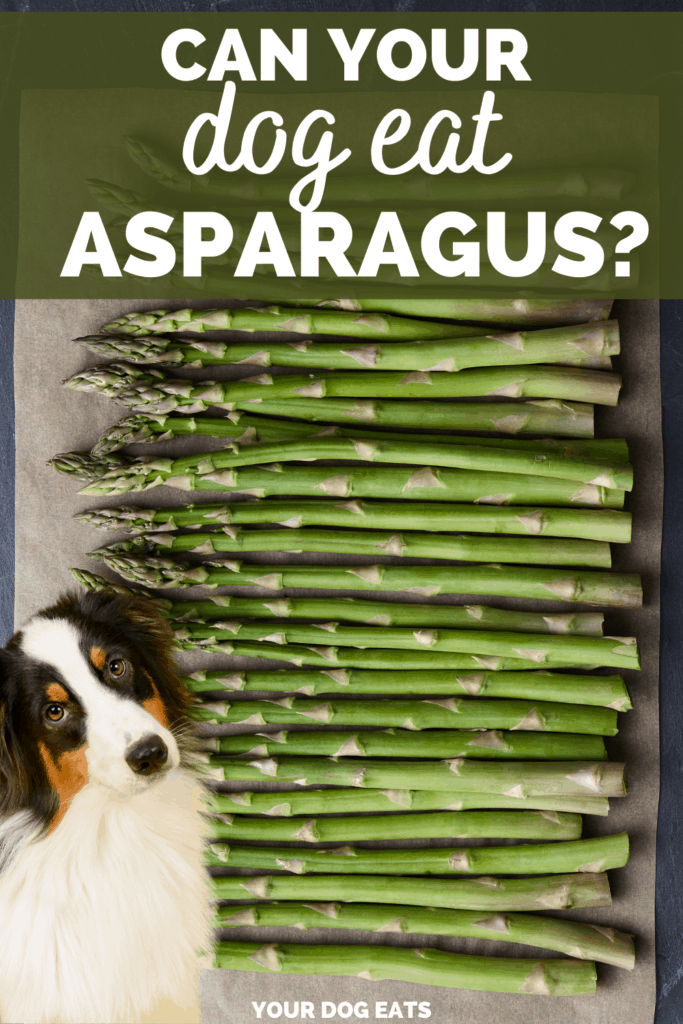This post was reviewed for veterinary accuracy by Cara Wright, DVM. For more information about our review process and Cara, please visit the About Us page.
Anyone who loves their pup might be wondering – can a dog eat asparagus? Whether you’re thinking about handing your dog a few table scraps or if he got into some of your food already, rest assured – yes, it’s OK for your dog to eat a few pieces of chopped asparagus. However, there are a few helpful pointers to keep in mind.
Can dogs eat raw asparagus?
Asparagus is a green spring vegetable that looks almost like long pointy spears. The bottom of the stalk is very fibrous and tough.
You’re probably familiar with this from your own cooking; you don’t see most humans walking around munching on raw stalks. Even when you roast or sauté asparagus, you most likely cut off the bottom third of the veggie. While the rest of the asparagus stalk can be a bit tough too, cooking tenderizes it – with the most tender part being the top.
One of the main dangers with feeding a dog raw asparagus is a choking hazard. If your dog tries to eat the large fibrous stalks whole, it’s plausible that they could accidentally choke on them.
For that reason, raw asparagus should always be chopped for your dog.
But while you can chop and feed it to your dog raw, doesn’t mean it’s a good idea. Because it is a bit tough and fibrous (especially the bottom portion), your dog may experience some gastrointestinal upset. This is very individualized from dog to dog. You may notice:
- Gas
- Diarrhea
- Vomiting
Because of this, it’s always a good idea to cook the asparagus prior to serving it to your dog.
Can dogs eat cooked asparagus?
Yes – and cooked asparagus is likely to be much easier on their digestive system compared to raw asparagus. It also reduces the choking hazard (but again, it should be chopped).
Asparagus provides some nutrition benefits for dogs, similar to humans. It’s a good source of Vitamins A, C, and E, and is rich in antioxidants.
It also contains fiber, which according to Cummings Veterinary Medicine Center at Tufts University, can promote digestive health and good gut bacteria in your pet (though if your dog truly needs more fiber, a concentrated fiber supplement is often a better option – talk to your veterinarian).
If you are feeding your dog any cooked asparagus, avoid using fats like butter or oil when preparing it. Those fats – while adding delicious flavor to our food – can make your pet sick with stomach upset. You also never want to feed asparagus to dogs that’s been cooked with garlic or onions.
Instead, you can steam, boil, grill, or roast the asparagus without any added fats. If your dog decides he wants a few bites of that, it should be A-OK.
You don’t want to feed excessive amounts of asparagus to your dog, though, as he needs other foods to meet his complex nutritional needs.

Does asparagus make dog pee smell weird?
Yes! Just like with humans, asparagus can change the scent of your dog’s urine. This is due to asparagusic acid, a compound high in sulfur . When this is broken down in the body, it produces volatile compounds that vaporize easy, which much of the human population (though not all) are able to smell.
Clearly, this is not a big issue if your dog is trained to pee outdoors. But if your dog still has accidents in the house, the way asparagus makes the urine smell may be more unpleasant to deal with.
What about growing asparagus? Is the plant dangerous?
Some people get nervous about their dog getting into a bowl of asparagus, or even growing asparagus at home. They may have heard about the fact that asparagus fern is toxic to dogs, according to the ASPCA.
First, let’s clarify this: asparagus fern is a completely different plant compared to edible asparagus. It is not the same plant that produces the asparagus you eat.
If you have this plant growing at home though (some have it as a houseplant or outdoor plant), you’ll probably want to get rid of it to keep your pup safe. If your dog does happen to get into asparagus fern, contact your veterinarian for guidance.
There also is a concern you need to keep in mind with growing regular edible asparagus. According to Small Animal Toxicology, several species of asparagus plants can be a contact allergen or cause “slight indisposition” if consumed.
This is due to compounds called sitosterol, stigmasterol, and their glucosides. That’s all very sciencey, but the key message is that it’s wise to keep your dogs away from growing asparagus plants so they don’t eat the other parts of the plant that may be dangerous.
The highest levels of those toxic compounds are found in the asparagus “berries”. If you’re growing edible asparagus at home, you may notice those at the end of the growing season. Interestingly, these are actually not berries at all, but are seed pods. They are toxic for both humans and dogs to eat.
A Final Word from Your Dog Eats
As you can see, a few bites of cooked asparagus should not be harmful for your treasured dog.
This information is provided for informational purposes only. Remember, always contact your veterinarian if you have any concerns over your pet’s health and nutritional needs.
Be sure to pin this page to refer to later! 🙂


